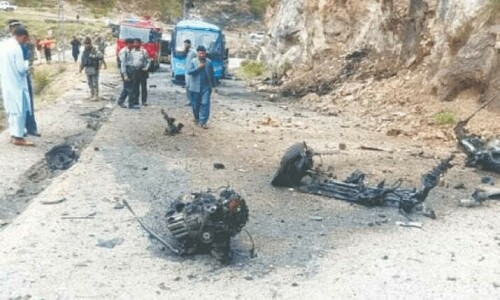ISLAMABAD, July 1: A World Bank study has calculated an estimated cost of Rs343.7 billion which Pakistan loses due to poor hygiene practice and sanitation.
The amount comes to 3.94 per cent of the country’s GDP.The study titled ‘The Economic Impacts of Inadequate Sanitation in Pakistan’ further says that out of the total amount, Rs69.52 billion constitutes direct financial cost, which is equivalent to 0.8 per cent of GDP.
Keeping in view the sanitation situation, a two-day national workshop, co-hosted by Unicef and the Water and Sanitation Programme (WSP) of the World Bank, began here on Monday.
It aims at assessing the prevailing situation of sanitation and deliberating upon the course of action up to 2015 and beyond.
The workshop will also discuss the agendas for the forthcoming major events on sanitation including the South Asian Conference on Sanitation and Pakistan Conference on Sanitation.
“Poor sanitation, hygiene and lack of safe drinking water trigger a downward slide into poverty,” said MNA Maryam Aurangzeb, who is also an environmentalist, and was the main speaker at the workshop.
“Women and adolescent girls are disproportionately affected by lack of access to adequate sanitation,” she said.
“While efforts made by Unicef, WSP and other partners in the sanitation sector are highly appreciable, I urge all partners to join hands and strive harder towards achieving the sanitation-related Millennium Development Goals (MDGs) in Pakistan,” Ms Aurangzeb emphasised.
Speaking at the workshop, Unicef Representative in Pakistan Dan Rohrmann called upon the government, and bilateral and multilateral donors to make further commitments to water and sanitation sector.
“In addition to necessary investments, coordination and harmonisation is crucial both for sustainable development and humanitarian response. Improved sanitation for all in Pakistan is achievable. Let us make it a reality,” Mr Rohrmann said.
In collaboration with Unicef, WSP has supported the provincial governments in designing largescale sanitation programmes in Pakistan.
It has also contributed significantly to institutional capacity development of water and sanitation service providers in urban areas of the country.
The World Bank study which was based on the state of sanitation in 2006 was released last month.
It says the need for special treatment and attention are needed in areas where the poor population lives and in rural areas where children are more at risk from diarrhea and malnutrition.
Education and awareness campaigns are needed at all levels, particularly in schools, to promote personal hygiene, such as hand-washing and other inexpensive means to minimise the incidence of diseases and the impact of poor sanitation indirectly, the study said.
The major component of the total health-related costs was premature mortality which consumed Rs216.29 billion.
Productivity losses due to illness are estimated at Rs40.55 billion with total productivity losses contributing to 11.80 per cent of the total health costs.
Water-related economic cost of poor sanitation has been calculated at Rs15.98 billion, equivalent to 0.18 per cent of the GDP.
Key findings of the report further showed that the coverage level for sewage collection was estimated at 50 per cent nationally, with 20 per cent coverage in rural areas, and only 10 per cent of sewage being effectively treated.
Treatment plants existed in a few cities, with only a few fully functional. The national figures hide rural-urban disparities.
Ninety per cent of the urban population had access to improved sanitation, while the percentage of rural population having this facility was 40.
In the rural areas, 45 per cent of the population still practiced open defecation, the study says.












































Dear visitor, the comments section is undergoing an overhaul and will return soon.